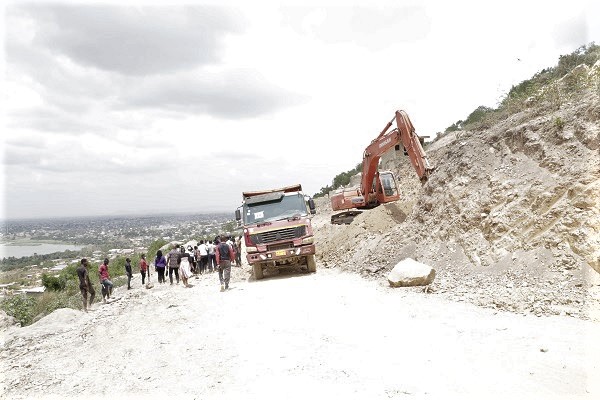
Minister halts sand winning along Weija Dam
The Minister of Sanitation and Water Resources, Mrs Cecilia Dapaah, has halted activities of sand winners around the Weija Dam over the threat such activities posed to water supply to about 1.5 million residents in the Greater Accra Region.
This followed challenges faced by the Ghana Water Company Limited (GWCL) in treating water from the dam as a result of the high siltation due to the activities of sand winners.
The minister halted the activities yesterday when she led a delegation from the GWCL and a security task force to the dam site to check on encroachment at the catchment areas from Weija to Nsawam.
Sand winning activities are thriving around the Weija Dam catchment area, with truckloads of sand in constant supply from the area.
Large portions of the area appeared to have been excavated along the dam.
Orders
Mrs Dapaah ordered the excavation machine in operation to immediately stop, while the tipper trucks carrying sand were ordered to offload them.
The minister said a report was received from the GWCL that the illegal sand winning activities in the area were affecting the operations of the Weija Water Treatment Plant.
She said the ministry embarked on an investigation and realised the report was true.
“The Weija Treatment Plant takes care of about 1.5 million people in the Greater Accra Region, so if the integrity of the system is it means we are playing with the lives of 1.5 million people,” Mrs Dapaah said.
Currently, she said government was looking for funding to rehabilitate and expand the plant to enable it take care of the population growth “and if we allow them to continue doing this, there would not be any land in the next few years for any expansion project to take place,” she added.
She said the ministry would go back to the drawing table and come back with the appropriate deterrent measures to secure the area and the dam.
However, she said with immediate effect, sand winning activities along the dam should be halted.
She also urged the management of the Nsawam Treatment Plant to plant trees within the inner boundaries of the 100-metre buffer zone to prevent and discourage people from encroaching.
High cost of production
The Managing Director of GWCL, Dr Clifford A. Braimah, said due to the activities of the sand winners, the water in the dam now contained a lot of nitrogen and required extra efforts to treat it.
“Previously, we required only about 200 bags of aluminum sulphur a day to treat our water supply, but now we need about 300 bags, and what it means is that processing cost has gone up, and unfortunately we are not like the other businesses that when the cost of production goes high, you can transfer it to the customer,” he said.
He said the water turbidity had gone high and that it also required a lot of time to purify it before it could be distributed.
Dr Braimah urged the public to desist from engaging in activities that could affect the country’s river bodies.
